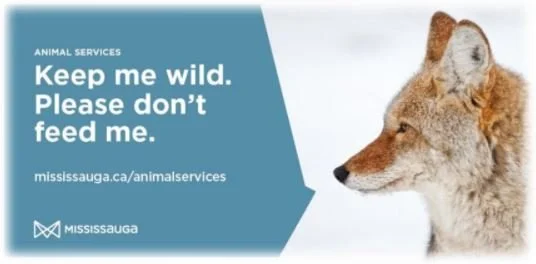Feeding Wildlife and the Law
FINES RANGE FROM $300 TO A MAXIMUM OF $100,000
Feeding of wildlife is prohibited in the City of Mississauga as per the Animal Care and Control By-law 0098-04 as amended, Part IV, Section 10, No person shall feed or permit the feeding of a wild animal or leave or permit the leaving of food or attractants of any type or in any form out of doors in such a manner as to attract, or be accessible by, a wild animal, feral or stray domestic animal on private or public property.
Section 10 does not apply to the feeding of song birds on a property, provided the owner or occupier places seed in a bird feeding device that is sufficiently above grade and maintained in a sanitary condition.
Sanitary Condition means a condition that does not result in an accumulation of faecal matter, pigeons, odour, insect infestation, or rodent attractants which endanger the health of any person or animal; or that would not disturb or would likely disturb the enjoyment, comfort or convenience of any person.
Feeding is prohibited because it can harm wildlife and cause public safety issues for the community.
TIPS TO HELP WILDLIFE AND REDUCE CONFLICTS
The City of Mississauga encourages residents to enjoy and live in harmony with native wildlife. If you enjoy wildlife we would encourage the planting of native flora that will enhance your property and attract wildlife naturally without altering natural behaviour. Adopt responsible bird feeding practices. Reserve bird feeders for winter months and ensure feeders are clean, tidy and seed mix attracts native songbirds. Bring feeders inside at night to discourage raccoons and discontinue feeding if you are attracting rodents, foxes or coyotes.
Store garbage and recycling in an area inaccessible to wildlife – do not compost meat products
Place garbage to the curb on the morning of collection
Remove debris or clutter from property/decks/balconies that may provide hiding or nesting sites for wild animals or rodents
Conduct a spring and fall exterior home inspection to ensure shingles, eaves, soffit, facia and vents are in good repair
Install screens or caps on all vents and chimneys with secure, safety approved mesh
Sheds, decks or any structure without a foundation should be screened below ground in a reverse L formation, (12” down, and 18” away from the structure) to prevent burrowing animals
Cover window wells with mesh or commercial window well covers
Trim tree branches away from your roof and remove fallen fruit and pet faeces
Mississauga Animal Services
735 Central Parkway West
Mississauga, ON L5C 4H4
Inquiries: 905-896-5858
WHY FEEDING WILDLIFE CAN DO MORE HARM THAN GOOD
Spread of Disease
Feeding wildlife results in higher concentrations of wildlife species living closely together which increases the potential spread of disease in wildlife populations. When birds like pigeons, ducks and geese gather in large numbers they can become ill from the bacteria in unconsumed food or due to the increased faecal matter in the environment. Improperly maintained bird feeders or poor quality bird feed can actually cause birds to die of illnesses such as salmonella, botulism or other deadly bacterial infections.
Illness, Malnutrition, Starvation
Like humans, if an animal fills up on junk food they may not consume an adequate diet which can lead to nutritional deficiencies or illness. Ducks and geese naturally feed on vegetation and water insects. A nutritionally deficient diet of seed or bread can cause the growing bones of goslings or duckling to become permanently deformed. Wildlife that is being fed an unnatural diet may suffer malnutrition as they are not consuming the proper nutrients to stay healthy. Animals that become dependent on an artificial food source may also lose their ability to forage and can potentially starve if the food source is of poor quality or discontinued.
Wild Animals Bully Each Other for Food and Habitat
All wild animals are territorial and will compete for food resources. Feeding can cause animals to invade neighbouring territories to fight over feeding grounds causing physical harm to each other. Bird feeders may attract large flocks of non-native species such as sparrows, starlings or feral pigeons which may compete for food resources and habitat with native bird species.
Wild Animals Become an Easy Target for Predators and Motor Vehicle Collisions
Prey animals such as deer, rabbits and squirrels become an easy target for predators as they continually visit a food source rather than moving around or naturally seeking cover. Food sources can cause wildlife to cross busy roadways to get to a food source.
Damage To Property
Raccoons, skunks, and squirrels typically live close their food sources which may have them causing damage or denning in neighbouring homes and properties.
Feeding Causes Safety Concerns for Wildlife and Humans
Animals that have been fed by humans view people as a food source, causing them to approach humans for food. Coyotes, foxes and even turkeys can become pushy and even dangerous if they learn to approach humans for food. When this happens people lose their tolerance for wildlife and pressure authorities to have the animal permanently or lethally removed.
Rats and Mice
Providing food for birds and squirrels can attract rats and mice due to the spillage of seed. An increase in rodent activity can attract larger predators like coyotes and foxes which can also prey on neighbourhood pets. If you have rats on your property you should discontinue feeding the birds until the rodent issue is resolved.
Keep Wildlife Wild
This information is provided by the City of Mississauga Animal Services
For more information visit www.mississauga.ca/animalservices

